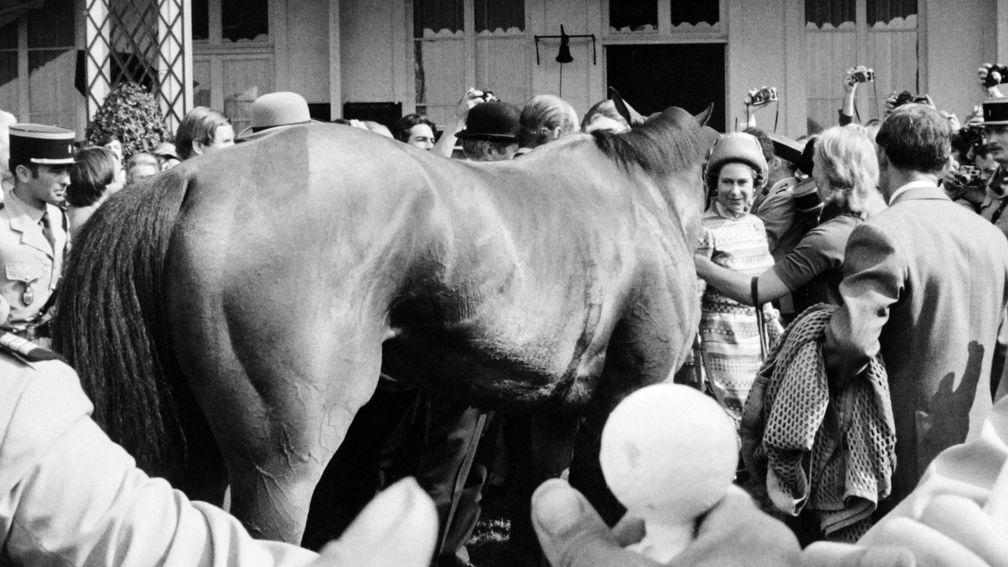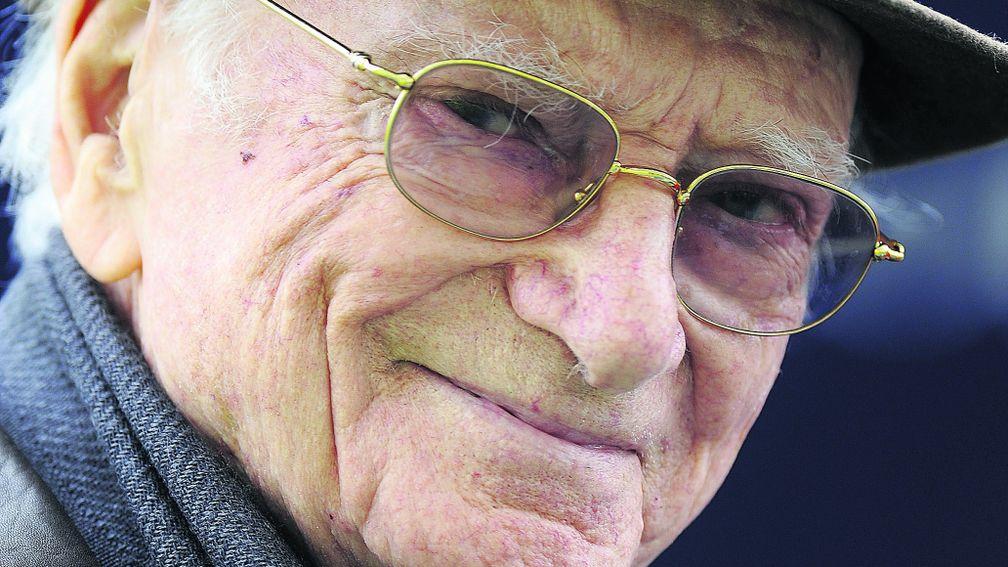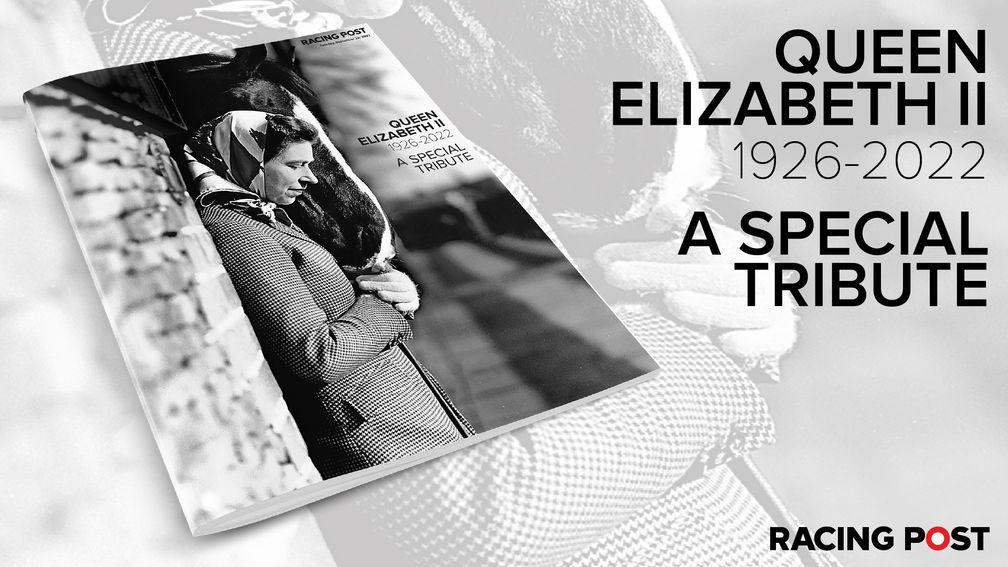Highclere's Diane: 'It was one of the happiest racing days of the Queen's life'

In an extract from his 2012 book Her Majesty’s Pleasure, Julian Muscat recounts a successful outing to France.
Part of the Queen’s reasoning in sending Highclere to France after her victory in the 1974 1,000 Guineas was that the Prix de Diane is run over an extended mile and a quarter. The step up in distance, from one mile at Newmarket, would not be as pronounced as it would be for the Oaks, which is run over one and a half miles. Since Highclere’s sire Queen’s Hussar had excelled over a mile it amounted to a happy compromise – although Highclere’s victory was so comprehensive she would have gained it over any distance.
Events on Prix de Diane day will never dim in the minds of the central cast. Highclere’s travelling itinerary went without a hitch. The only snag came when the taxi taking the Queen’s entourage to Chantilly racecourse was caught up in traffic which, the driver informed his cargo, was down to the royal visit. When told that they were, in fact, the Queen’s men, the driver charged down the hard shoulder with an abandon familiar to anyone who has ever ridden in the back of a Parisian taxi.
In the race itself a passage opened up for Joe Mercer that was every bit as inviting as the one by which he had just reached the racecourse. Highclere entered the home straight on the tail of the leader, Hippodamia, whose efforts to hold her advantage were laboured.
As Hippodamia toiled she veered away from the inside rail, where Highclere was waiting to pounce. One second Highclere was in danger of hitting racing traffic, the next she was into the clear and bounding away to victory.
At two lengths, Highclere’s winning margin over Comtesse De Loir brooked no argument. There was no need to call on the judge, as there had been at Newmarket. Indeed, Highclere was so emphatically superior that the Queen’s entourage spent much of the final furlong dancing a victory jig.
“It was absolutely not the way to behave in Her Majesty’s company,” Sir Michael Oswald reflected with a smile many years later.
Yet the royal party was not alone.The huge crowd at Chantilly rose as one to acclaim Highclere’s victory, in the process triggering scenes of pandemonium.
If the local gendarmes felt victory for the Queen would afford them a quiet afternoon, they were quite mistaken. The winner’s enclosure was quickly swamped by ecstatic turfistes. For a while there was a danger the Queen might be caught in the crush – as was Sir Peter O’Sullevan, at Chantilly on duty of his own.
“Porchey [Lord Porchester, the Queen’s former racing manager] saw me in the crowd and waved me towards him,” O’Sullevan recalled. “But as I stepped forward someone trod on my heel and dislodged my shoe.

“So there I was, congratulating the Queen in one shoe and one stockinged foot. Happily there was no big toe poking out of it, because she of all people would have noticed it.”
At least O’Sullevan hadn’t shed a critical part of his attire in the royal presence. That fate so nearly befell Charles Engelhard when the Derby triumph of his Nijinsky in 1970 earned him a post-race audience with the Queen. As Engelhard climbed the steps to the royal box, the braces holding up his trousers suddenly snapped. He thus entered the fray with his arms clamping his top hat and binocular case to either side of his waist. By all accounts the Queen Mother’s face was a picture when Engelhard abruptly declined her offer to take the accessories from him in the interests of comfort.
Over at Chantilly, the gendarmes finally prevailed in their efforts to contain the exuberance. It was something the Queen herself would not forget in a hurry. Later that year, in her filmed conversation with O’Sullevan, she said: “I had never been racing in France when I had a horse running, and it was a lovely outing for me being there. The President [of France] was of course very kind and made it very easy for me to get to Chantilly. The crowd was tremendously friendly and after the race, when Highclere had won, they seemed even more friendly – luckily.”
There was also a fascinating role reversal between the Queen, who was there in a private capacity, and Marcel Boussac, the doyen of French breeders who hosted the Queen’s visit. Although Boussac often wore a stern expression there were moments on that day when his face betrayed the excessive strain as his country’s designated representative.
The Queen, by contrast, exuded joie de vivre. The boot was on the other foot: it was Boussac who bore the facade of concentration redolent of the Queen at official functions.
“I think it was one of the happiest racing days of the Queen’s life because she received such a welcome,” O’Sullevan recalled. “Usually, everything seems to get coated in dullness if royalty is involved. The cordon sanitaire goes up.”
Highclere’s victory also highlighted a royal penchant for spontaneity.
On the plane home, as spirits rose on the depletion of in-flight champagne stocks, the royal horsemen received an invitation via the cockpit radio. A car would be waiting at the airport to sweep them straight to Windsor Castle for an impromptu dinner celebration. It was clear the Queen did not want a magical day to end.
Click here for a detailed look at the Queen's achievements in racing
In Tuesday's Racing Post

Published on inNews
Last updated
- Join Racing Post Members' Club for the very best in racing journalism - including Patrick Mullins' unmissable trip to see Gordon Elliott
- Racing Post Members' Club: 50% off your first three months
- Join the same team as Ryan Moore, Harry Cobden and other top jockeys with 50% off Racing Post Members' Club
- 'It’s really exciting we can connect Wentworth's story to Stubbs' - last chance to catch master painter's homecoming
- The jumps season is getting into full swing - and now is the perfect time to join Racing Post Members' Club with 50% off
- Join Racing Post Members' Club for the very best in racing journalism - including Patrick Mullins' unmissable trip to see Gordon Elliott
- Racing Post Members' Club: 50% off your first three months
- Join the same team as Ryan Moore, Harry Cobden and other top jockeys with 50% off Racing Post Members' Club
- 'It’s really exciting we can connect Wentworth's story to Stubbs' - last chance to catch master painter's homecoming
- The jumps season is getting into full swing - and now is the perfect time to join Racing Post Members' Club with 50% off